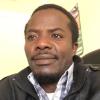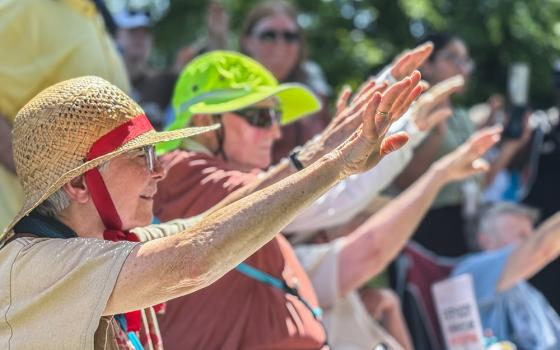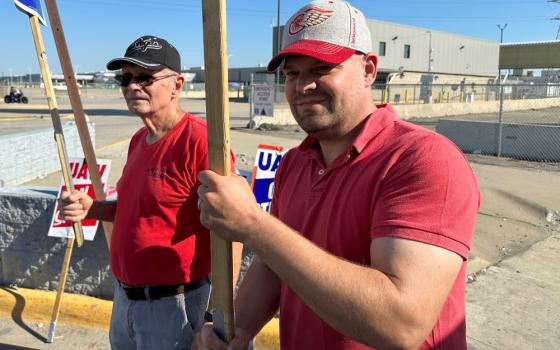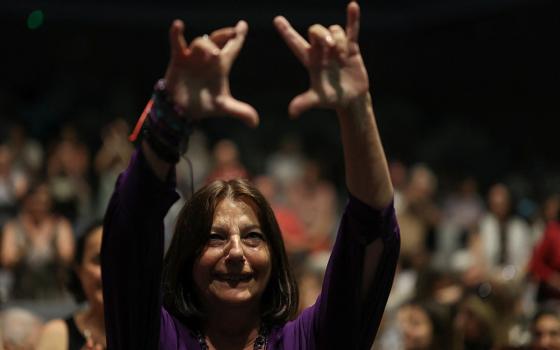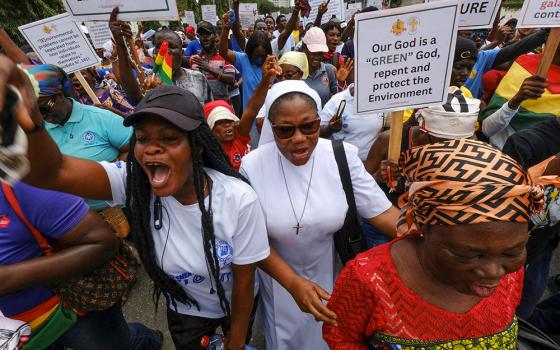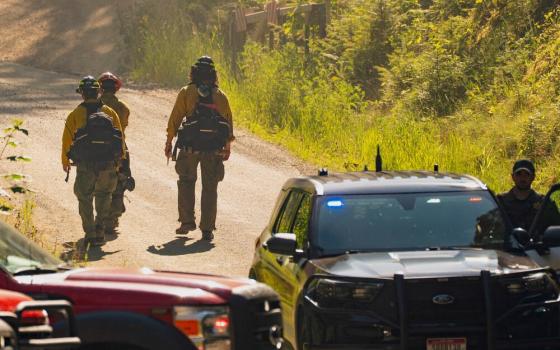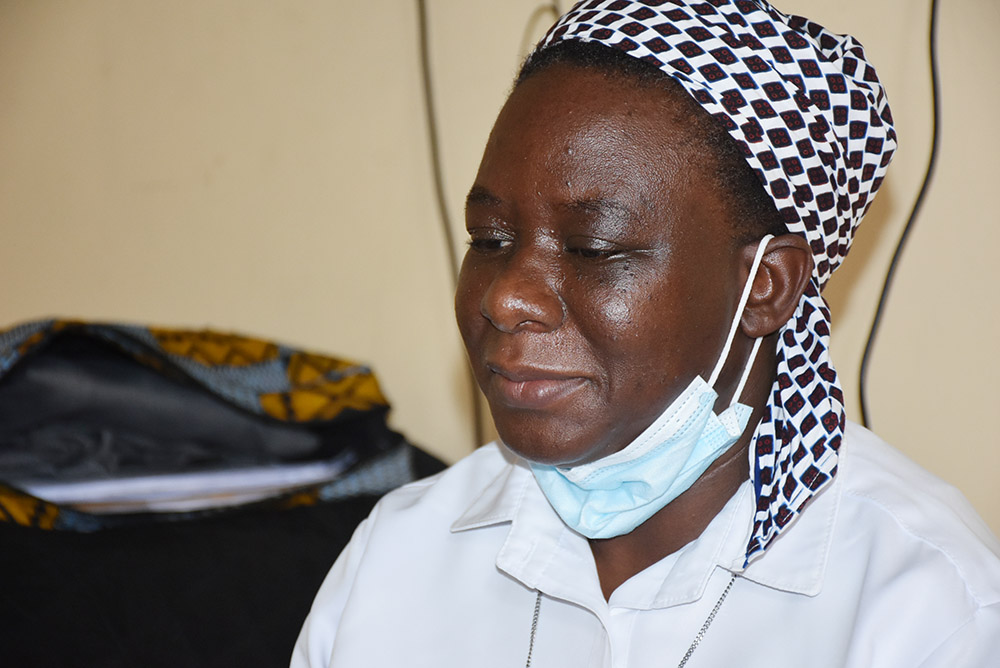
Sr. Beatrice Mwansa of the Daughters of the Redeemer in her office at the Zambia Institute of Mass Communications in Lusaka (Derrick Silimina)
While Zambia transitioned into pluralism and liberalization of the media in the 1990s, Catholic sisters were already at the center of their ministries for a better world.
As the nuns continue to embody the mercy of God through their vocations, Sr. Beatrice Mwansa of the Daughters of the Redeemer believes society cannot underestimate the role of the media in evangelism because it can quickly spread God's message to the world.
"We cannot underestimate the role of the media in evangelization because the media have the power to spread God's message to the whole world in a flash of a minute," said Mwansa, a renowned media tutor at both private and public media training institutions in Lusaka, Zambia's capital. "This gives me joy to be part of this apostolate of spreading God's message through radio or television and even informing those who are in the media industry,"
Mwansa was attracted to the Daughters of the Redeemer in part because of its motto, "To radiate Christ's goodness to the people," and made her first vows in 1995. The next year, she started her studies in mass communication at the University of Zambia, where she earned a bachelor's degree in mass communication and a master's degree in communication for development in 2002 and 2008, respectively.
After graduating with her bachelor's degree in 2002, Mwansa worked at Radio Icengelo, a Catholic community radio station, for three years. As a head of programming, she supervised the news and production departments; oversaw radio announcers, producers and news reporters; and managed all operational budgets.
"Radio broadcasting exposed me to meeting different people from various works of life," she said. "It widened my horizon of understanding different community issues affecting people and moving toward being action-oriented."
After she earned her master's degree, she embarked on her lecturing career. Since 2009, she has been teaching at various public, private and religious institutions, such as the Zambia Institute of Mass Communications, Cavendish University, Mulungushi University and Zambia Catholic University.
GSR: Tell us, what drew you to media and journalism?
Mwansa: What drew me to journalism was the desire or urge to evangelize like our Lord Jesus Christ did as he went about proclaiming the kingdom of God from town to town. That inspired me to take up this apostolate.
Advertisement
While at the radio station, I produced religious programs and programs on social issues. I always felt joy to share some reflections from the word of God and to give hope to people experiencing different problems.
I was also happy to do research on social issues such as alcohol abuse, housing, unemployment, juvenile delinquency, etc.
What are the topics that you usually lecture on?
Since I started lecturing, I have taught news reporting, investigative reporting, media and society, sociology, media and social context, media law and ethics, foundations of public relations and customer relations. These courses have widened my understanding in reporting skills, in-depth investigative reporting, how the media interacts with society, how the media operates with the law, and how journalists uphold ethical standards in their profession.
I have also acquired skills in module writing for the students studying via distance learning. Teaching different courses has also taught me to be up to date with current issues.
How do you see your role as a media expert relating to your religious vows and life?
My role as a media expert vis-à-vis my religious vows and life blends very well because it gives me satisfaction to share the word of God with a lot of people via radio or television. It gives me joy to teach upcoming journalists to be principled and uphold ethical standards. As you may be aware, most of these ethics stem from Judeo-Christian ethics and Christian values. My role is to encourage truth-telling, objectivity, impartiality, integrity, etc.
I have learned to be mainstream in my lessons. I emphasize peace journalism because I believe the media has the power to build and to destroy. It is a faithful and obedient servant but can also be a dangerous master. The media can act as glue to cement society, but at times, it can act as dynamite and can blow issues and society into pieces. My role is to be a defender of justice and peace, democracy, responsibility and prudence.
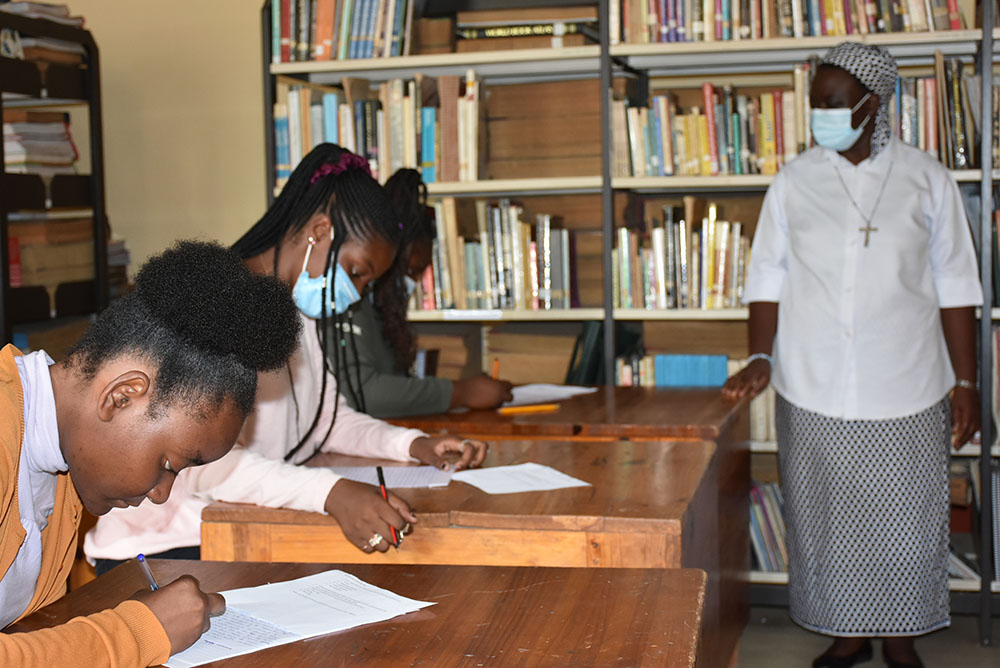
Sr. Beatrice Mwansa of the Daughters of the Redeemer teaches a journalism class at the Zambia Institute of Mass Communications in Lusaka. (Derrick Silimina)
Recently, I had the privilege of serving as a media regulator at the independent broadcasting authority and also as a communication commissioner for Zambia's conference of Catholic bishops, and I have realized that there is a need to encourage media houses to adhere to media ethics.
Have you taken an active role in educating and communicating with the public about safety and health protocols during the coronavirus pandemic? Or the need for vaccines and their safety?
During the coronavirus pandemic, particularly in March 2020, I realized that the many conspiracies and false information that were circulating were filling everyone with so much fear. I appreciated the need to correct this and spread true information about the pandemic.
So, I decided to give feedback to the reporters at the Ministry of Health who were giving briefings to the minister of health before addressing the nation on the status of the pandemic. I would share with them whatever I heard or observed on the ground; for instance, if COVID guidelines were not followed in the minibuses, and the many fears and myths that the people had.
When teaching the students, I shared ideas on how to go about giving important information and how to write a COVID-19 campaign and use the media to support the fight against the pandemic.
When the vaccines came, there was a need to encourage the radio and television stations to send messages that would help people to improve their lifestyle, such as exercising and eating healthy, to fight COVID-19.
As a regulator, I participated in monitoring radio and television programs across the country vis-à-vis COVID-19 messages. The authority also lobbied partners and the government to pay the community radio stations who were airing these programs.
What are your spiritual messages about hope?
When COVID-19 hit our country, it reminded me that we are fragile and not exempt from diseases and death, as well. After the government quickly closed churches, schools and workplaces and encouraged people to work from home, then reality dawned and woke us up to face the pandemic head-on. This experience, I remember, triggered fear, anxiety, stress and even pain as we began losing many people we knew and loved.
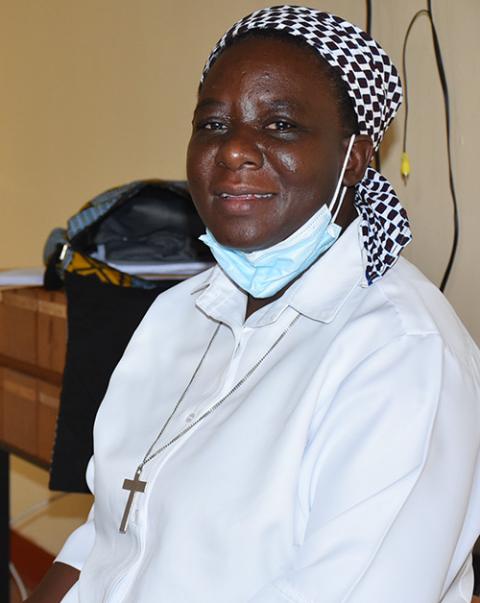
Sr. Beatrice Mwansa of the Daughters of the Redeemer in Lusaka, Zambia (Derrick Silimina)
The statistics we heard were now translated into names of people we knew. The crisis had come, and we needed to face it. There was no turning back or running away. It was difficult, but we needed to be honest, be real and accept it.
For us Christians, this was the time to spread the message of hope and give meaning to people so that they could have the courage to face the crisis. It was the word of God that sustained us each day.
It is said that the phrase "Do not be afraid" is echoed 365 times in the Bible. To hear God telling those who were affected directly or indirectly "Do not be afraid" really uplifts our spirits and gives us reason to live in joy again.
What lessons are to be learned about communication from the experience of the pandemic?
There are many lessons to be learned from the experience of the pandemic. Truth is sacred; hence, the need to counter false information is key. As media practitioners, there is a need to educate the people on conspiracy theories and bring out the truth from well-researched documentation.
The other lesson is to be professional when dealing with the COVID crisis. There is a need to balance up stories and debates. There is also a need to develop critical thinking and deal with the issue holistically rather than deal with emotions.
What do you think are the most important traits for journalists to have?
There are many attributes for journalists, but the most important traits are truth-telling. Every report should be fully complete. Every journalist must ensure accurate information is disseminated. Accuracy is more important than speed.
A sound journalist must avoid disinforming people and provide space for the right to reply where allegations are being made. Whatever they write must be free from sensationalism.
Every piece of information must be double-checked from sources, avoiding single sourcing and ensuring fairness and balance. Every journalist must treat all with respect, not as a means to your journalistic end.
